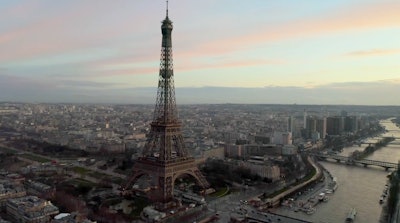
 Tom Arendas, the chief creative officer at global production company Shiraz Creative.Photo: Courtesy of Shiraz Creative
Tom Arendas, the chief creative officer at global production company Shiraz Creative.Photo: Courtesy of Shiraz Creative
Travelers and event professionals alike rejoiced when the CDC recently announced that citizens re-entering the United States from a foreign country no longer need to show a negative COVID-19 test. But even with this obstacle out of the way, planning an event in Europe or the United Kingdom can still feel as daunting as climbing Mount Everest.
The good news is that BizBash has you covered. We sat down with Tom Arendas, the chief creative officer at full-service event design and production company Shiraz Creative which, between 2001 and 2014, was founded in New York and debuted subsequent offices in Miami, LA, and most recently, in London.
“I’m the one who criss-crosses the world, ... so you’re talking to the right person!” Arendas quipped.
1. Understand local laws and regulations, and get the right permits.
“I know it sounds like a boring side of the process; however, it can ultimately be the breaking point if you don’t realize during the early process what you need to get an event actually going,” Arendas said of brushing up on a country’s laws and permit requirements.
Take England, for example, where Arendas recalls producing a festival in Trafalgar Square, a public plaza in Central London. Here, he “had to file for two very different types of permitting in what I would call exactly the same square.”
“The north side would fall under the City of Westminster’s council,” and “five meters to the south” would have “different rules in terms of sound level, the amount of people, ticketing, and health and safety” because it falls under a different government council. “It’s about the nuances,” Arendas stresses.
 Tropical, branded libations from Shiraz's Visa activation.Photo: Courtesy of Shiraz Creative
Tropical, branded libations from Shiraz's Visa activation.Photo: Courtesy of Shiraz Creative
He also points to a time in Russia when he made the very mistake he now advises against, when Shiraz was tapped to outfit an activation for Visa on a road-facing property.
“What we didn’t realize was that the road has a lane reserved for the government, so they have five lanes each way. What that meant was anything outward-facing in terms of branding would have to be approved by the government because government officials would see it when they’re in their cars,” he explains.
“But that’s not something that you would generally consider,” Arendas adds of the mishap. He also notes the challenge of obtaining the permit in time for the event, and urges other planners to not make the same mistake and put in much-needed forethought.
Oh, and be sure to budget for permits as well.
However, don’t let the “P” word be intimidating, and consider these basic differences between the United States and England your starting point.
| United States | England | |
Law | Licensing and permit laws are balanced under the First Amendment. | The Parliament of the United Kingdom outlines licensing regulations in the Licensing Act 2003 (c 17). |
| Working Visas | N/A | Work permits for staff: specify how long you’re visiting for, why you’re visiting, and when you plan to leave. |
| Timing | Permits could require up to 30 days to be processed. | Permits could require up to 28 days to be processed. |
| When to Consider Permits and Licenses | -when playing music outdoors | -for site permissions |
2. Hire a local team to overcome geographical, language, and cultural barriers.
Arendas refers to a production team as a “Holy Trinity” of sorts, “with two fabricators and one painter that you have 24/7.” He adds jokingly: “You have to have the Holy Trinity. Otherwise, there’s no point in going there [abroad].”
He also suggests doing a site visit before making the jump to a foreign country, and spending that time not only getting the lay of the land, but also “setting up meetings with people in the local market.”
“If I could give you one big piece of advice, hire yourself that one person that’s local and on the ground—and do not let them go. Just latch onto them, because they’ll be your Wikipedia in a much more efficient and cost effective way than if you had to find it yourself.”
Looking for another way to broaden your team’s global scope? “Hire an agency that’s based there,” Arendas proposes. Having a relationship with an agency could come in handy, “because sometimes [international] clients want to work with agencies that they already know and trust.” A plus? “They speak the local language, and they have the connections,” Arendas says.
He also urges planners to look for agencies with flexible working hours to overcome challenges related to time zones, plus cultural differences when it comes to working limitations. “I always say there’s a lot that can happen in 48 hours, which applies to the United States and the United Kingdom. But something like that in France—impossible,” he notes.
 April 12-24, 2022, Shiraz Creative produced a kickoff party for cryptocurrency company Coinbase and TV broadcaster PBWS at Bridge Club Paris. Arendas says this is when he learned that Brexit hadn't made shipping across UK borders impossible. "We ended up building in London and shipping," he adds, noting that it only took some extra paperwork and planning time.Photo: Courtesy of Shiraz Creative
April 12-24, 2022, Shiraz Creative produced a kickoff party for cryptocurrency company Coinbase and TV broadcaster PBWS at Bridge Club Paris. Arendas says this is when he learned that Brexit hadn't made shipping across UK borders impossible. "We ended up building in London and shipping," he adds, noting that it only took some extra paperwork and planning time.Photo: Courtesy of Shiraz Creative
“It really stems from the way the European Union regulates people’s working hours,” Arendas says, adding that in the United States, “we work 12-hour days and no one really blinks an eye.”
To mitigate any of these issues, when Arendas is on a big project, he “tends to work with agencies that are more flexible,” adding that “they can handle those time zones better, especially if they have a presence in Europe.”
Another solution could be shipping fabrication across borders, which, to Arendas' surprise, is still possible after Brexit, despite the United Kingdom no longer being part of the European Union. For a recent event in Paris, Arendas says his team “ended up building in London and shipping.”
“It just requires a few extra days of paperwork for some of the regulations that you have to follow, and there’s some extra taxes that apply, but it’s not impossible. It just requires an extra few days of planning.”
And as far as business etiquette, don’t be surprised if you’re met with people who are more blunt than you’re used to in France—or more straightforward in Germany. “I don’t want to generalize, but just to tell you about my experience…working with Germans—it’s kind of a cliche, but they say they’re super organized and straight to the point. It’s 100% true,” Arendas says of his positive experience producing events in Munich and Berlin. “They give us a run for our money,” he adds.
But ultimately, “everybody’s there for one reason—to do a good job. Never take it too personally.”
3. Hire an interpreter.
“Always, always, always,” Arendas said on the topic. “You have to have someone that is able to interpret even just a contract and be able to talk to local vendors in their own language.”
The chief creative officer cited language barriers as one of the greatest challenges in putting an event together overseas. “Everything breaks down if the communication doesn’t exist.”
Arendas notes that in language, a fluent speaker is important because it’s all in the nuances. He cites a time when Shiraz was producing an event in Germany, and “we were all talking about the same thing, but we were all talking about something different,” he says.
Arendas' biggest takeaway? “Effective communication is 50% of the success.”



















